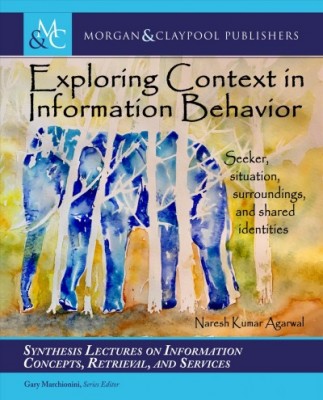| Exploring Context in Information Behavior: Seeker, Situation, Surroundings, and Shared Identities Contributor(s): Agarwal, Naresh Kumar (Author), Marchionini, Gary (Editor) |
|||
 |
ISBN: 1681736098 ISBN-13: 9781681736099 Publisher: Morgan & Claypool
Binding Type: Hardcover - See All Available Formats & Editions Published: December 2017 * Out of Print * Click for more in this series: Synthesis Lectures on Information Concepts, Retrieval, and S |
||
| Additional Information |
| BISAC Categories: - Computers | System Administration - Storage & Retrieval - Computers | Human-computer Interaction (hci) - Computers | Information Technology |
| Series: Synthesis Lectures on Information Concepts, Retrieval, and S |
| Physical Information: 0.5" H x 7.5" W x 9.25" L (1.19 lbs) 163 pages |
| Descriptions, Reviews, Etc. |
| Publisher Description: The field of human information behavior runs the gamut of processes from the realization of a need or gap in understanding, to the search for information from one or more sources to fill that gap, to the use of that information to complete a task at hand or to satisfy a curiosity, as well as other behaviors such as avoiding information or finding information serendipitously. Designers of mechanisms, tools, and computer-based systems to facilitate this seeking and search process often lack a full knowledge of the context surrounding the search. This context may vary depending on the job or role of the person; individual characteristics such as personality, domain knowledge, age, gender, perception of self, etc.; the task at hand; the source and the channel and their degree of accessibility and usability; and the relationship that the seeker shares with the source. Yet researchers have yet to agree on what context really means. While there have been various research studies incorporating context, and biennial conferences on context in information behavior, there lacks a clear definition of what context is, what its boundaries are, and what elements and variables comprise context. In this book, we look at the many definitions of and the theoretical and empirical studies on context, and I attempt to map the conceptual space of context in information behavior. I propose theoretical frameworks to map the boundaries, elements, and variables of context. I then discuss how to incorporate these frameworks and variables in the design of research studies on context. We then arrive at a unified definition of context. This book should provide designers of search systems a better understanding of context as they seek to meet the needs and demands of information seekers. It will be an important resource for researchers in Library and Information Science, especially doctoral students looking for one resource that covers an exhaustive range of the most current literature related to context, the best selection of classics, and a synthesis of these into theoretical frameworks and a unified definition. The book should help to move forward research in the field by clarifying the elements, variables, and views that are pertinent. In particular, the list of elements to be considered, and the variables associated with each element will be extremely useful to researchers wanting to include the influences of context in their studies. |
Contributor Bio(s): Agarwal, Naresh Kumar: - Naresh Agarwal is an Associate Professor at the Simmons School of Library and Information Science (College of Organizational, Computational, and Information Sciences) in Boston, Massachusetts. He earned his Ph.D. from the National University of Singapore (NUS)'s Department of Information Systems, School of Computing. Naresh has published more than 40 articles in international journals, conference proceedings, and as book chapters in the fields of information behavior and knowledge management. As of November 2017, researchers have cited his work more than 370 times (as listed by Google Scholar). Naresh looks at the way people look for information and the contextual factors that impact their choice of information sources. He seeks to understand and synthesize the apparent contradictions in this phenomenon and tries to reconcile multiple perspectives. Apart from seeking, Naresh also studies serendipitous information encountering and the causes and effects--both on the recipient and the sender--of information stopping and information avoidance behaviors, especially by people who use smartphones and social media. Naresh teaches courses in technology and web development, theories of information science, knowledge management, and evaluation of information services. He has held various leadership positions at ASIS&T (the Association for Information Science and Technology). He was a member of its Board of Directors from 2012-2014. Naresh was the Chair of its Membership Committee (2015-2017), the Conference Co-Chair of its 80th Annual Meeting, Washington, D.C., Oct. 27-Nov. 1, 2017, and he was awarded the ASIS&T James M. Cretsos Leadership Award in 2012. Prior to entering the doctoral program at NUS, Naresh worked for six years in technology roles in the voice-over-IP, bioInformatics, and digital cinema industries.Marchionini, Gary: - Gary Marchionini is the Cary C. Boshamer Professor of Information Science in the School of Information and Library Science at the University of North Carolina at Chapel Hill. His Ph.D. is from Wayne State University in mathematics education with an emphasis on educational computing. His research interests are in information seeking in electronic environments, digital libraries, human-computer interaction, digital government and information technology policy. He has had grants or contracts from the National Science Foundation, the U.S. Department of Education, the Council on Library Resources, the National Library of Medicine, the Library of Congress, the Kellogg Foundation, and NASA, among others. He was the Conference Chair for the 1996 ACM Digital Library Conference and program chair for the 2002 ACM-IEEE Joint Conference on Digital Libraries. He is editor-in-chief for ACM Transactions on Information Systems and serves on the editorial boards of a dozen scholarly journals. He has published more than 150 articles, chapters, and conference papers in the information science, computer science, and education literatures. He founded the Interaction Design Laboratory at UNC-CH. |
| Customer ReviewsSubmit your own review |
| To tell a friend about this book, you must Sign In First! |